
- Topics 1519
- Industrial 57
- Troubleshooting Guides 32
- Restaurant Management 142
- Bar Management 66
- Catering Tips 41
- Bakery Management 47
- Food Trucks & Concessions 44
- Advertising & Marketing 40
- Eco-Friendly Tips 11
- Facility Layout & Design 49
- Coffee Shop Tips 31
- Installation & Maintenance 58
- Janitorial & Pest Control 33
- Safety & Sanitation 110
- Startup Tips 111
- Menu Design 11
- Kitchen & Cooking Tips 104
- Hospitality Management 24
- Pizza & Sandwich Shop Tips 28
- Smallwares 39
- Food Prep 101
- Tabletop Items 20
- Disposables 26
- Calculators & Tools 8
- Consumables 71
- Warewashing & Laundry 22
- Cooking Equipment 95
- Food Storage & Refrigeration 54
- Beverage Equipment 39
- Office Supplies 5
How to Choose the Right Food Service Chemicals for Your Commercial Kitchen
Last updated on Feb 13, 2026Use the following links to navigate and learn more about commercial kitchen chemicals:
- Key Considerations
- Coffee & Espresso Machine Cleaners
- Deep Fat Fryer Cleaner
- Beer & Wine Line Cleaning Chemicals
- Oven Cleaner & Grill Cleaner
- Cutting Board & Block Whitener
- Ice Machine Cleaners & Refrigeration Cleaners
- Glass Washing & Sanitizing Chemicals
- Degreasers
- Delimers & Descalers
- Drain Openers & Maintainers
- Food Grade Lubricants & Food Safe Lubricants
- Dishwashing & Sanitizing Chemicals
- Popcorn Kettle Cleaners
- Single Use Chemical Packets
- Soft Serve Machine Cleaner and Sanitizer
- Vegetable Wash
There are food service chemicals for every application in your commercial kitchen, whether its for cleaning your equipment, general maintenance, or warewashing. Consider these factors when reviewing food service chemical options:
Cleaning vs Sanitizing
In order to keep your kitchen equipment free of harmful viruses or bacteria, it's important to understand the difference between cleaning, sanitizing, and disinfecting. Cleaning surfaces with soap and water removes visible dirt, but using an appropriate commercial kitchen sanitizer or disinfectant removes viruses and bacteria.
Versatility
Some food service chemicals have more general uses, like all purpose degreasers and sanitizers, while other kitchen chemicals have very specific uses, like soft serve machine cleaners. Read product descriptions carefully, so you understand the exact purpose of the chemical and make the best decision for your kitchen.
Packaging Size
Before making a food service chemical purchase, determine how much of the product you’ll need. Consider choosing pre-measured single use chemical packets for convenient cleaning that reduces chemical waste. Buy chemicals in bulk for a cost effective cleaning routine.
Liquids, Powders, or Tablets
Each chemical form has advantages and disadvantages, depending on your cleaning goals.
Safety
Be mindful of products with high concentrations and potentially dangerous chemicals. To avoid hazards in the kitchen, look for products that are labeled “mild” or “food safe.” Always follow directions for diluting and rinsing.
Environmental Impact
If environmental responsibility is important to your organization, consider searching for products that will break down naturally without harming the environment.

Types of Food Service Chemicals
There are many different types of food service chemicals you can use to keep your commercial kitchen clean. Some chemicals focus on cleaning the visible dirt from kitchen surfaces, while others are specifically designed to sanitize the surface and eliminate microscopic germs.
Chemicals designed to sanitize may be extremely potent, so be sure to determine your intended use for the chemical before making a purchase. To ensure you find the best products to meet your needs, search for food service chemicals that are designed to clean specific areas of your commercial kitchen.
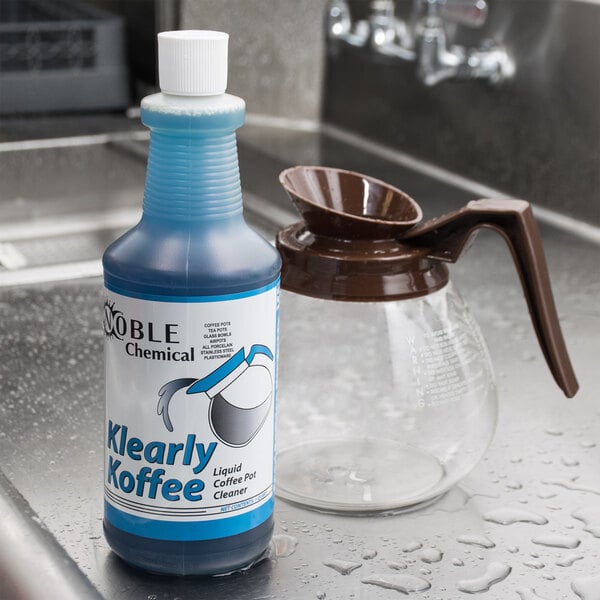
Coffee and espresso cleaners are necessary to keep your coffee equipment working efficiently and eliminate any buildup that could alter the taste of your products. There are many different types of coffee and espresso machine cleaners for different uses. Many products can be used interchangeably between coffee and espresso machines. If you’re looking to clean a specific piece of equipment, be sure to check out the intended use of each product.
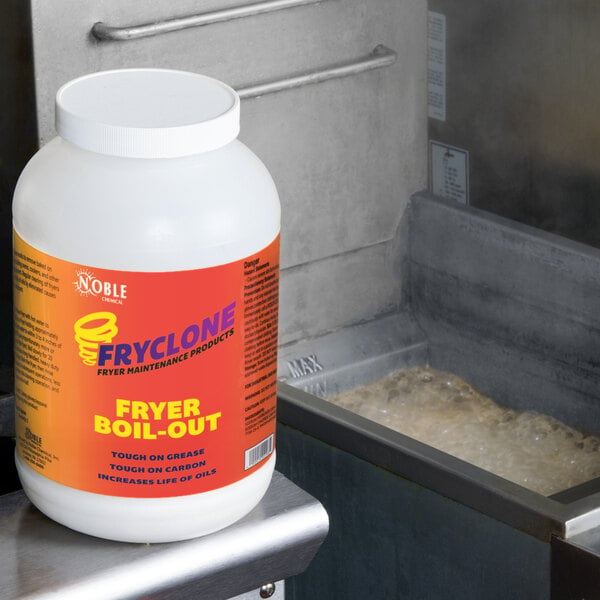
Cleaning your deep fat fryer is essential to ridding your fryer of food remnants and odors, thereby preserving the natural flavors of your food. If you’re using the same deep fryer for multiple food combinations, cleaning your fryer is particularly important. Fryer cleaner is available in three different forms, which include liquid, powder, and tablet. Using a tablet cleaner saves time and eliminates waste because they are pre-measured.
How often should you clean your deep fat fryer?
The frequency at which you clean your deep fat fryer depends on the amount of product you’re frying and the combination of foods you’re using in your fryer. Some kitchens may choose to clean their fryers every evening, if they are frying a large variety of foods in high amounts. In general, most kitchens clean their fryers every 2-3 days.
Fryer oil stabilizer is a chemical used to treat fryer oil and improve its longevity by removing sediment and carbon deposits. It also reduces oil absorption of fried foods for healthier, tastier products.
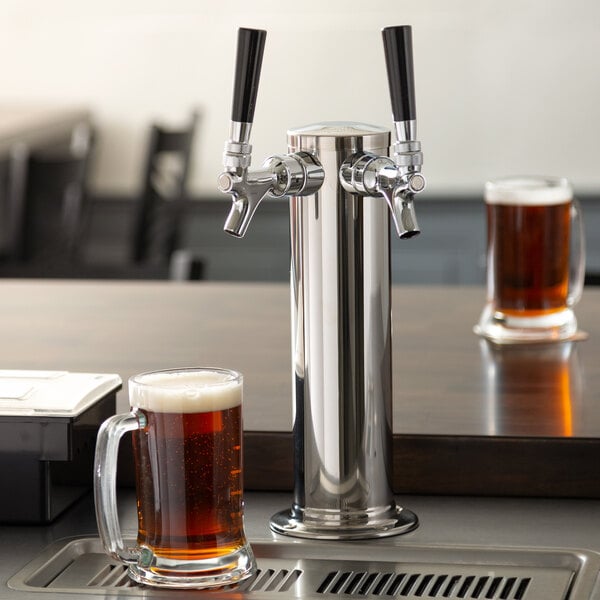
Beer and wine lines are susceptible to unwanted buildup that can alter the taste of beverages and prevent liquid from flowing through the narrow tube. Keep your lines clear with these cleaning products.
How often should beer and wine lines be cleaned?
Beer and wine lines should be cleaned at the minimum every six weeks. Many kitchens choose to clean their lines more often, usually every two weeks. Frequent cleanings will maintain your lines and reduce the risk of more serious blockages and issues occurring.
You also need to make sure you have the proper kitchen cleaning chemicals for the beer and wine glasses. For more information on how to properly clean beer glasses, check out our Beer Glass Cleaner guide.
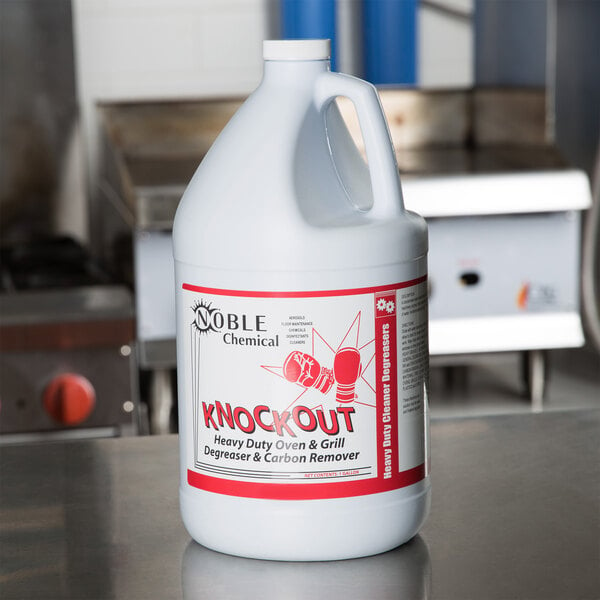
In any food service operation it is important to have the oven and grill cleaned and sanitized. With liquid cleaners, aerosol cleansers, and pre-mixed rinsing solutions, getting rid of baked-on fat, grease, and carbon from your grill has never been easier. This selection of cleaners and sanitizers is not only used for restaurant purposes, these products can be used for your outdoor grill as well.
How often should I clean my oven?
You should clean your oven monthly to rid of the crusty buildup that usually occurs when cooking. The crusty buildup can alter the taste of your food, even with the high temperatures.
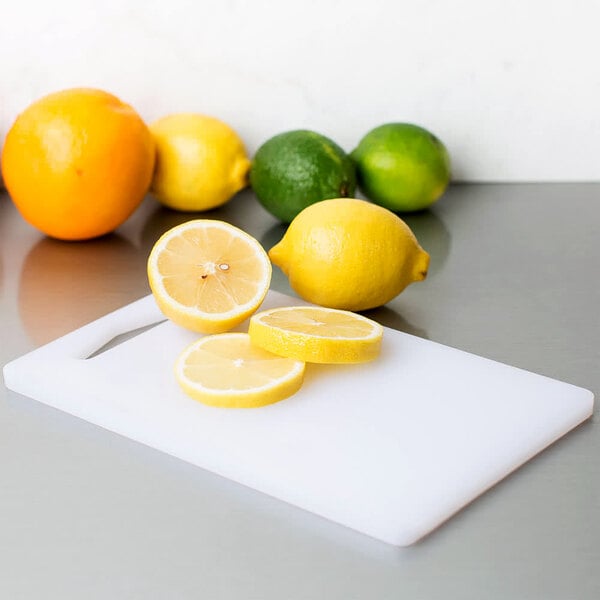
Board and block whiteners will clean and sanitize your cutting boards while also removing odors and whitening stains. Use these cutting board cleaners to keep your cutting boards looking brand new.
How often should you clean or whiten your cutting board?
All cutting boards should be cleaned after each shift or when switching between the different types of food you’re cutting. Plastic cutting boards are often easier to clean and maintain, so you may not need to whiten them as often as wood cutting boards. Regular cleaning will maintain the condition of your boards, prolong the life of your boards, and will prevent bacterial growth.
What’s the best way to whiten your cutting board?
Select a cutting board whitener with a potency that meets your needs. Spread cleaner across the surface of your cutting board. Allow the cleaner to soak into the pores of your board for the designated wait time (usually around 15 minutes). Rinse surface thoroughly before using the board. Repeat whitening and rinsing process for deep stains if necessary.
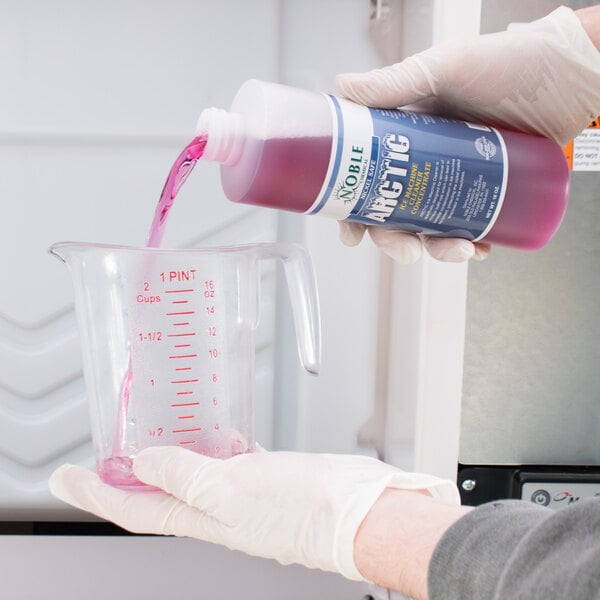
To ensure that your ice machines and refrigerators are operating properly, it is vital to clean these machines regularly to remove mineral buildup. Ice machine sanitizers are safe to use on nickel and tin surfaces and many products have multiple uses, such as cleaning the walls, floors, and equipment located in your freezers or coolers.
For more information, check out our How to Clean an Ice Machine guide.
Types of Glass Washing & Sanitizing Chemicals
Keeping your glassware clean is key to maintaining your image. Even the cleanest kitchens find it challenging to keep glasses sparkling. Check out these types of warewashing chemicals that will keep your glassware looking brand new!
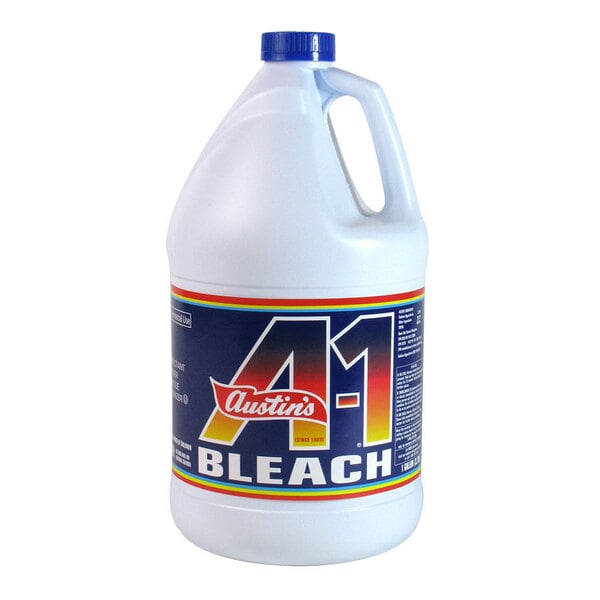
Bleaches/Destainers
Bleaches and destainers clean cloudy glasses and tough stains, like those from lipstick and coffee.
- Chemicla form: Liquid bleach solution should be diluted with water.
- Special tips: Bleach is a multipurpose cleaner, so it can also be used to clean many other kitchen surfaces. Be sure to rinse glasses thoroughly after use.

Cleaners
Cleaners remove lipstick stains, grease, smudges, and odors.
- Chemical form: Cleaning powder packets are mixed with water to meet your cleaning needs.
- Special tips: Look for manual dishwashing and electric dishwashing products. Also look for low sudsing formulas to meet your needs.

Detergents
Detergents clean dirt, grease food buildup, and lipstick stains.
- Chemical form: Detergents come in liquid and powder form depending on your preference
- Special tips: Look for products that rinse clean and are residue free. You may also choose products with special scents to complete your cleaning experience. Detergents vary in foaming and sudsing level, so be sure to choose products that will work with your sink or automatic dishwasher.
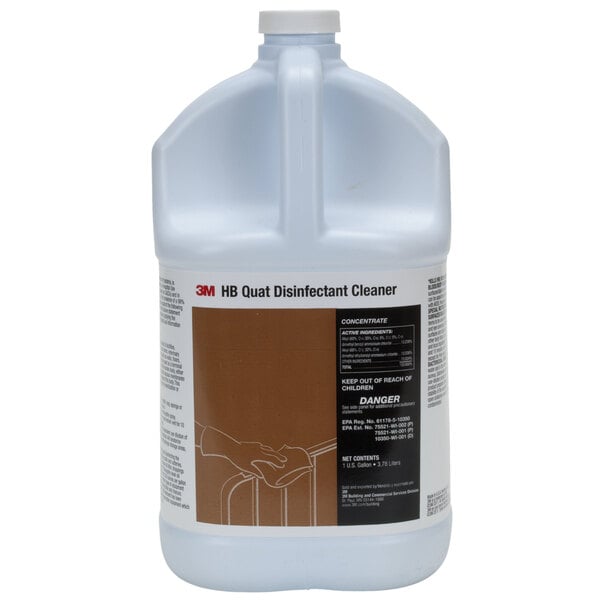
Disinfectants
Detergents eliminate harmful bacteria and viruses.
- Chemical form: Concentrated liquid disinfectants should be diluted with water.
- Special tips: Disinfectants can be used to clean many surfaces throughout your kitchen. They can also be used to clean bathrooms, floors, and bars.
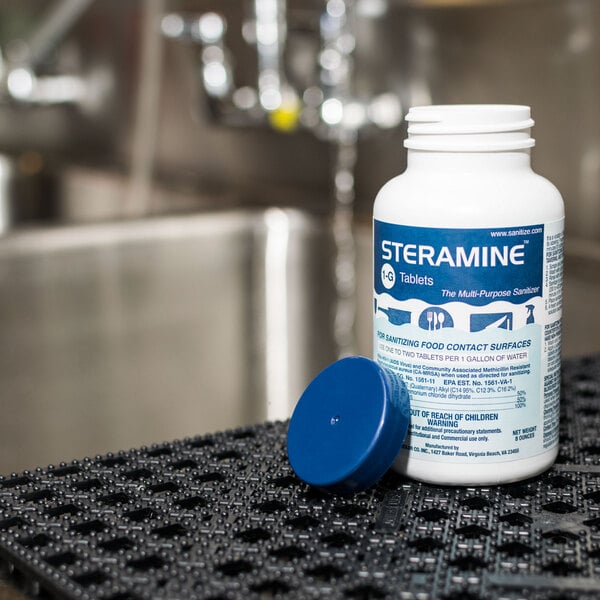
Sanitizers
Sanitizers eliminate harmful bacteria and viruses.
- Chemical form: Powder, tablets, and liquid sanitizers available.
- Special tips: Check for food safe and deodorizing sanitizers.
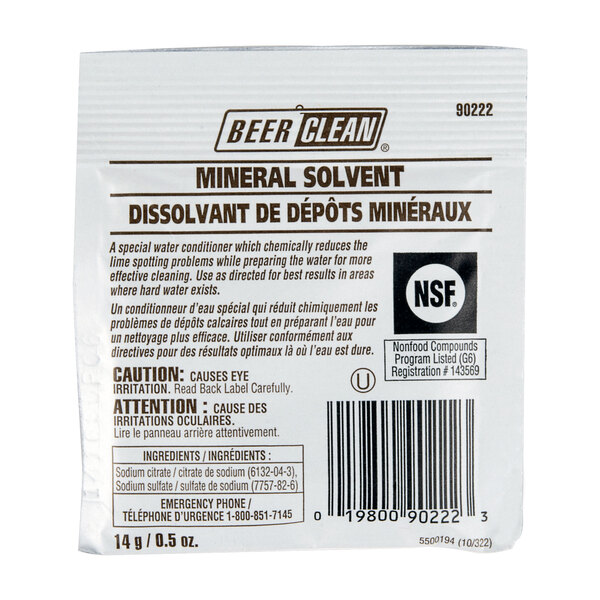
Solvents
Solvents condition hard water.
- Chemical form: Powder
- Special tips: Can be combined with detergent to boost cleaning power.
Degreasers target grease buildup on various kitchen surfaces including equipment, walls, and floors. When selecting a degreaser, consider whether you prefer a concentrated product or a ready-to-use diluted solution. You may also want to consider purchasing scented products to eliminate the smell of grease in your kitchen.
Why should I use a degreaser on kitchen floors?
Grease gets everywhere, even your floors. Degreasing the floors in your kitchen space is crucial to keeping your employees safe in the workspace. It is also important to keep your kitchen looking and smelling great.
What are the advantages of a concentrated formula vs. a ready to use formula?
Ready to use formulas are perfectly mixed and speed up the cleaning process. Concentrated degreasers allow you to customize the potency of your cleaning solution depending on the surface you're working with. If your kitchen surfaces are cleaned regularly, consider adding water to a concentrated formula to create a weaker solution, perfect for regular maintenance. If you're tackling a particularly greasy surface, use a more concentrated solution to break down the grease.
How often should you use a commercial kitchen degreaser?
When grease is left on kitchen equipment and surfaces, it will begin to smell and collect bacteria. Old grease can also negatively affect the flavors of the foods you serve. All areas exposed to grease in your kitchen should be degreased at the end of each day to ensure your customers' safety and protect the flavors of your foods.
When would you use an all-purpose cleaner vs. a degreaser?
All-purpose cleaners are great for kitchen spaces that encounter bacteria and soils but don't encounter a large amount of grease. Areas close to your cooking space tend to collect large amounts of grease that all-purpose cleaners may not be able to handle. Degreasers are specifically designed to handle caked-on grease but do not target other soils and bacteria.
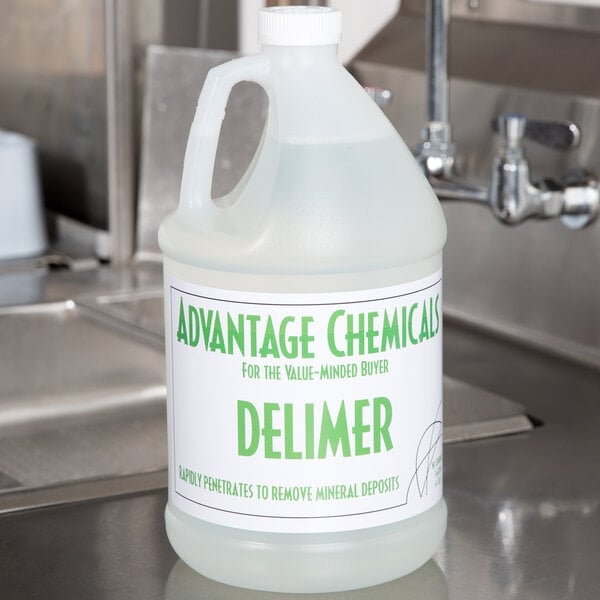
Scale buildup causes low flow problems and equipment inefficiencies. Delimers and descalers are necessary for removing mineral deposits and hard water buildup around your sink and dishwashing area and within heating elements. There are also delimer and descaler products available for particular areas of your kitchen, like faucets on coffee machines.
What can I expect from a good descaler?
A good descaler should remove minerals and hard water films, brighten metals, and be free from harsh fumes. Descaling also removes buildup from heating elements to prolong the life of your equipment.
Can you mix delimer and bleach?
It is never a good idea to mix cleaning products, especially harsh chemicals like bleach. The potent mixtures can damage your equipment, and the fumes could be harmful to you. Leave the mixing to the chemists!
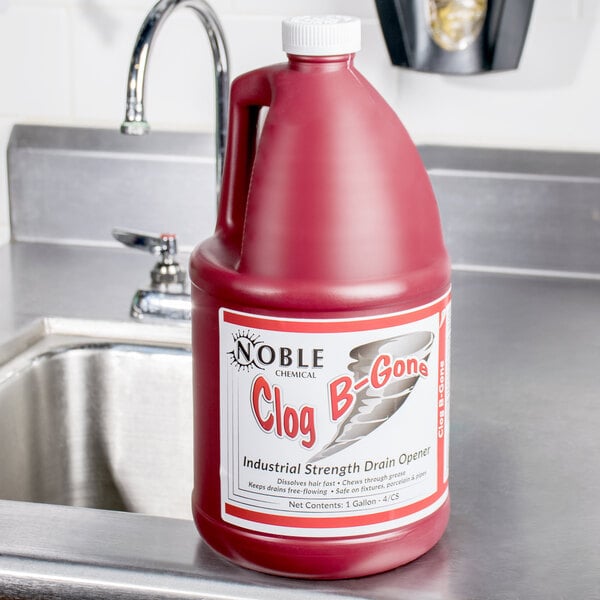
Drains in your commercial kitchen are susceptible to clogs from food, grease, and hair. Preventing drain blockages or removing minor clogs yourself can save you hundreds of dollars in plumbing bills. These products are designed to dissolve blockages and get your drains back to normal.
How often should you use a drain maintainer?
Drain maintainers can be used regularly to prevent severe drain clogs in the future. Drain openers are extra tough to remove buildup that's clogging your drain. Although regular drain maintenance can prevent the need for a plumber, be sure to track how often you're using drain openers. Severe drain clogs can cause pipes to burst. If you continually encounter clogs in the same drain, contact a professional.
Types of Food Grade and Food Safe Lubricants
Food safe lubricants are specifically designed for food service equipment and are safe to use on food processing equipment too. There are several types of food grade and food safe chemicals, each with their own set of advantages and disadvantages. Check out these food grade and food safe lubricants to see which type best fits your needs:
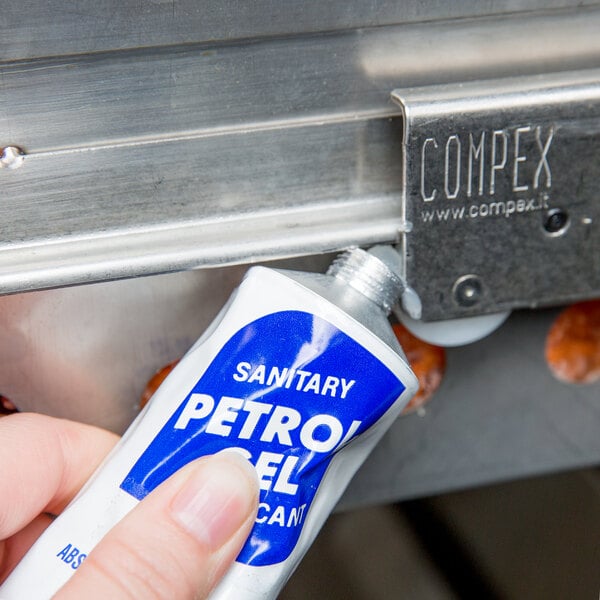

Grease
- Can be used with grease guns
- Good for chains and cables
- Resistant to water washout and pressure
- Can harden if operating temperature is too high
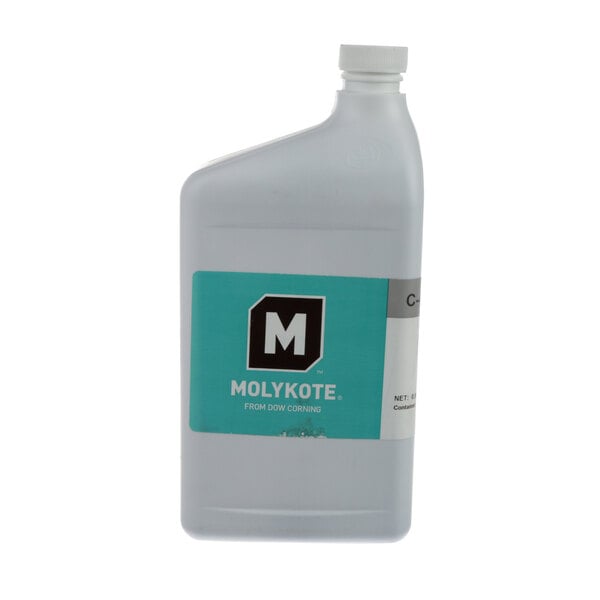

Lubricants
- Foaming food grade lubricants are great for clinging to chains and parts to avoid dripping
- Some sanitary lubricants should only be used on valves and gears that do not regularly come into contact with food
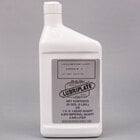

Oils
- Includes small tips for easy and exact application
- Designed for specific types of equipment, like vacuum packaging machines
- Not designed to cover a large area
Most dishwashing machines require at least one of the following products: detergents, rinse aids, and sanitizers. Detergents are available in liquid, solid, metal-safe, and phosphate-free varieties. Rinse aids are easy-to-use and help prevent spotting on tableware. Sanitizers are efficient in any environment and quickly remove grease, dirt, and grime from any surface.
It is important to not that high temperature dishwashers do not require a sanitizer since the sanitizing is completed with hot water whereas low-temperature dishwashers require a detergent, rinse agent, and chemical sanitizer.
How often should my dishwasher be cleaned?It is recommended that your dishwasher be cleaned at least once a month to avoid any buildup and to also keep it smelling good.
Can I use manual detergent in my dish machine?
With most if not all dish machines, it is recommended that using a detergent, sanitizer, or rinse aid will be most effective when it comes to efficiently cleaning your dishes. Some dish machines will allow a manual detergent but others will not.
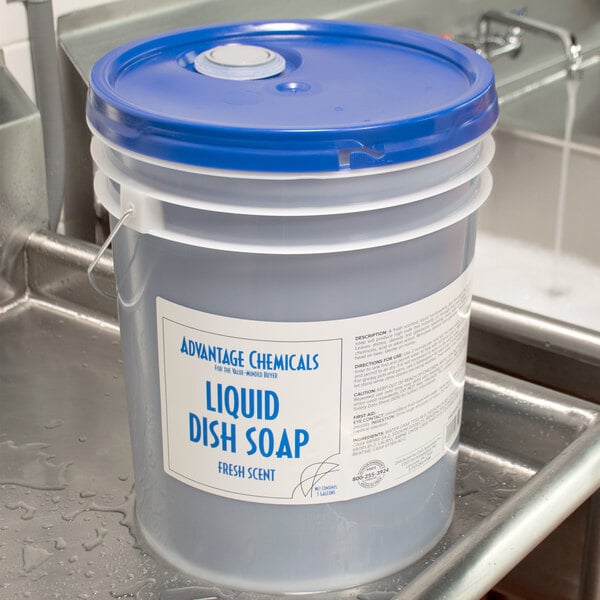
- Ideal for hand-wash-only items like non-stick pots and pans, aluminum cookware, and kitchen knives
- Available in liquid, powder, or solid form
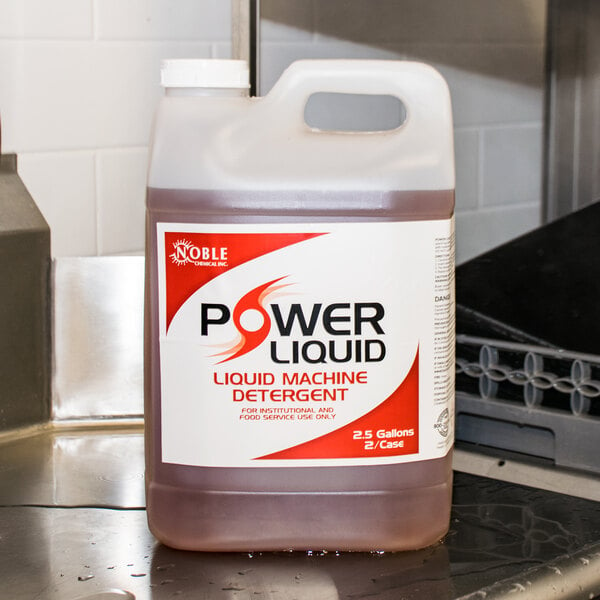
- Come in either high or low temperature formulas to work with your compatible dishwashing machine
- Available in liquid, powder, or solid form
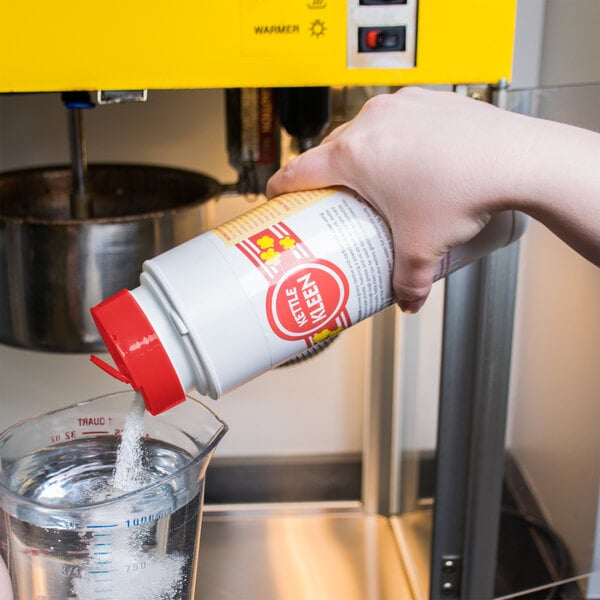
This popcorn kettle cleaner does just that, it doesn't contain any harsh chemicals to ensure that the popcorn won't be contaminated and will also make the inside look fresh and clean. To make sure you are getting the most out of your popcorn kettle cleaner, the powdered formula is mixed with warm water to increase the longevity of the product.
What's the best way to keep the popcorn machine clean?
Leftover popcorn oil can cause carbon deposits and burnt oil to develop, which will eventually affect the flavor of your popcorn. To maintain your machine, it is recommended that it be wiped down after each use. Before you start the cleaning process of your popcorn machine, make sure that it is unplugged and allow 30 minutes for the machine to cool down. Once the machine has cooled down, wipe down the interior and exterior to ensure leftover grease is removed.
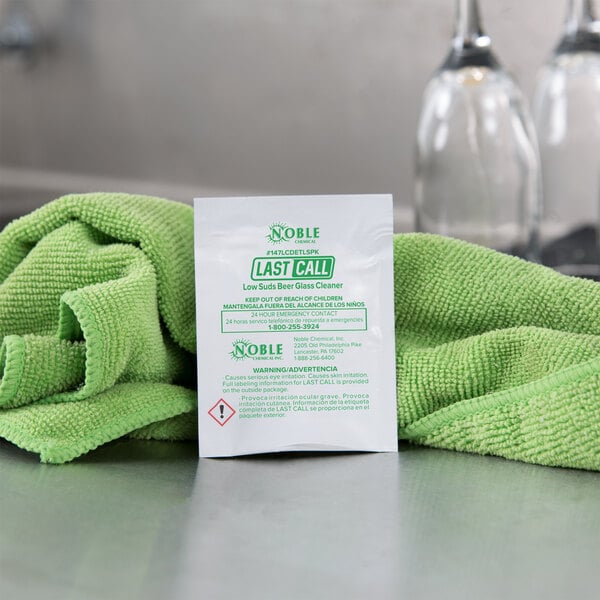
Single use packets make cleaning fast and easy and eliminate the hassle of mixing chemicals with water. These single use packets are not limited to one surface, they are available to be used on every surface. The single use packets have many benefits from cleaning uniforms to removing grease build-up and come in pre-measured amounts so no measuring is needed.
What's the advantage of single use chemical packets?
Single use packets offer an alternative for kitchen workers when dealing with chemicals. These packets come in pre-measured amounts so workers do not have to worry about measuring the chemicals properly. Utilizing these packets in your business also eliminate product waste.
How effective are single use chemical packets?
Single use chemical packets are equally as effective of their bulk counterparts.
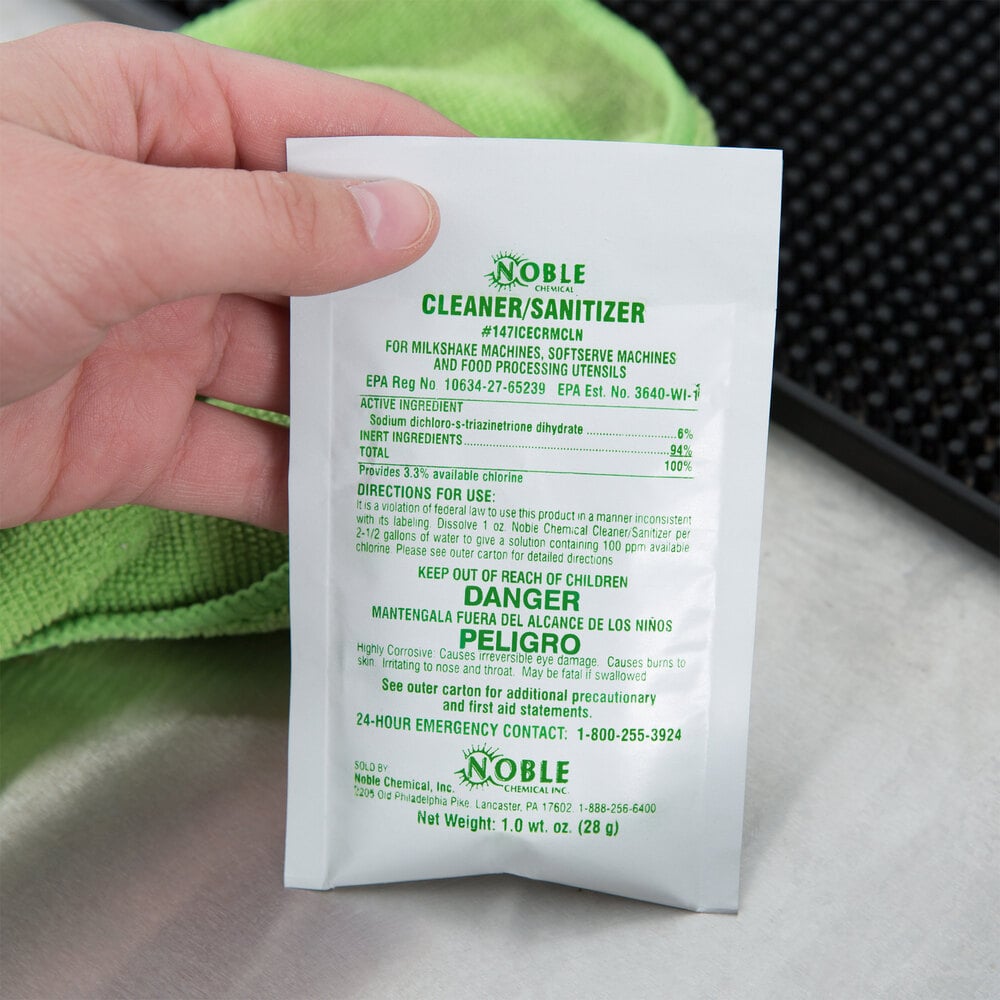
To make sure the products you are serving your customers is high-quality, continuously using cleaners and sanitizers for your ice cream, yogurt, soft serve, and milkshake machines will prevent blockages and keep up with high-volume orders. The cleaners and sanitizers are available in single use packets and in bulk for your buying needs.
How often should you clean and sanitize your soft serve machine?
When working with any dairy products, soft serve machines should be cleaned regularly, at least three times a week. By regularly cleaning your soft serve machine, it will increase the life of your machine and serve your customers fresh products. In general, it is recommended that you clean your machine every 2-3 days.
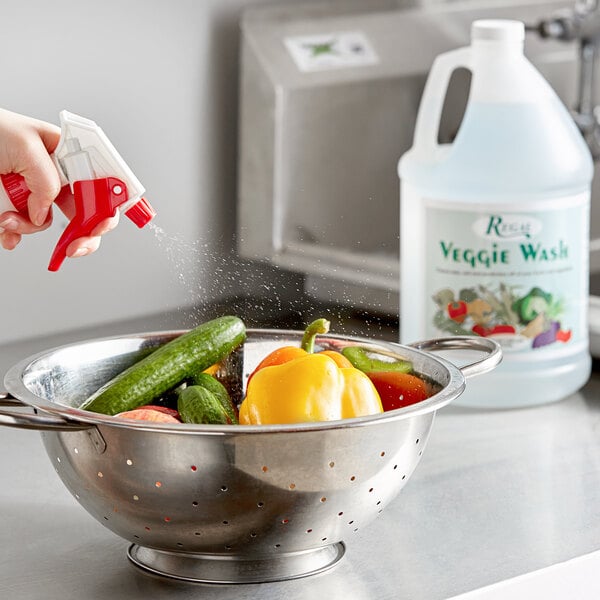
Vegetables and fruits are prone to browning, but vegetable wash will increase the shelf life of your vegetables and fruits while killing bacteria and removing pesticides. To get the best results out of your product, it is best used when the wash is diluted with water to clean a variety of fruits and vegetables.
Will veggie wash alter the taste of my vegetable?
In order to rid vegetables of bacteria, it is important to always wash them even if it is a simple rinse. Our veggie wash has food safe ingredients to ensure that your vegetables not only look great but taste great as well!
Why can't I just use water to clean my vegetables?
Food cleaning products like vegetable washes eliminate germs, bacteria, and pesticides, which reduces the risk of foodborne illness. It is important to avoid using regular soap to wash your vegetables as this can lead to an upset stomach and contain chemicals that are not meant to be consumed. Food grade vegetable washes safely remove contaminates, while keeping food safe for consumption.
Related Resources

March 2026 WebstaurantStore Coupon Code
Spring is approaching fast, and to celebrate we're offering great deals all March long here at WebstaurantStore! We've got amazing sales ranging from spring supplies and ingredients for seasonal dishes, equipment to ready your outdoor service for upcoming warmer weather, and much more! Take a look at our selection of sale items below and don't forget to enter the code SPRING26 at checkout to enjoy 10% off your purchases! Looking to save even more? Check out the new Webstaurant Rewards® Visa Business Card ! Sign up for a new card today and start earning rewards on every WebstaurantStore purchase, and save on a WebstaurantPlus subscription. Have a look at some incredible deals on disposable items with March's monthly coupon code! Whether you'

Food Safety Guidelines
Food safety guidelines are put in place to keep customers safe and prevent the risk of a foodborne illness outbreak. Any operation that serves food should establish protocols that meet the legal requirements for safe food handling. In this guide, we'll outline the most important aspects of food safety to help you build an effective program for your business and pass your next health inspection . Click below to learn about important food safety programs: Personal Hygiene Proper Food Handling Cleaning and Sanitizing Pest Control Purchase from Approved Suppliers Food Safety Training Food Safety Guidelines for Restaurants We'll cover the most important aspects of a successful food safety program so you can prevent a foodborne illness outbreak a
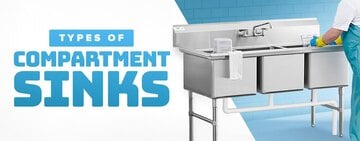
Types of Compartment Sinks
Compartment sinks are an essential piece of equipment in any commercial kitchen, providing a convenient and efficient way to wash and clean dishes as well as prep food items. These sinks can come with multiple compartments, each serving a specific purpose and function. Commercial kitchens are subject to strict health and safety regulations, and having the right type of compartment sink is crucial to maintaining a clean and sanitary workspace. Compartment sinks are available in various sizes and configurations to suit different needs and kitchen layouts .

